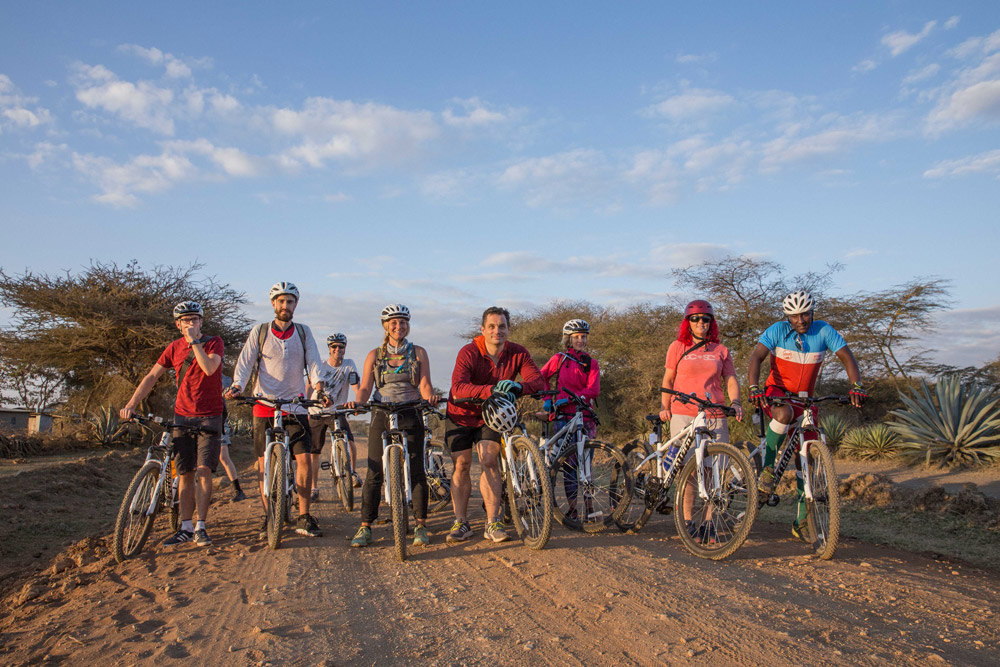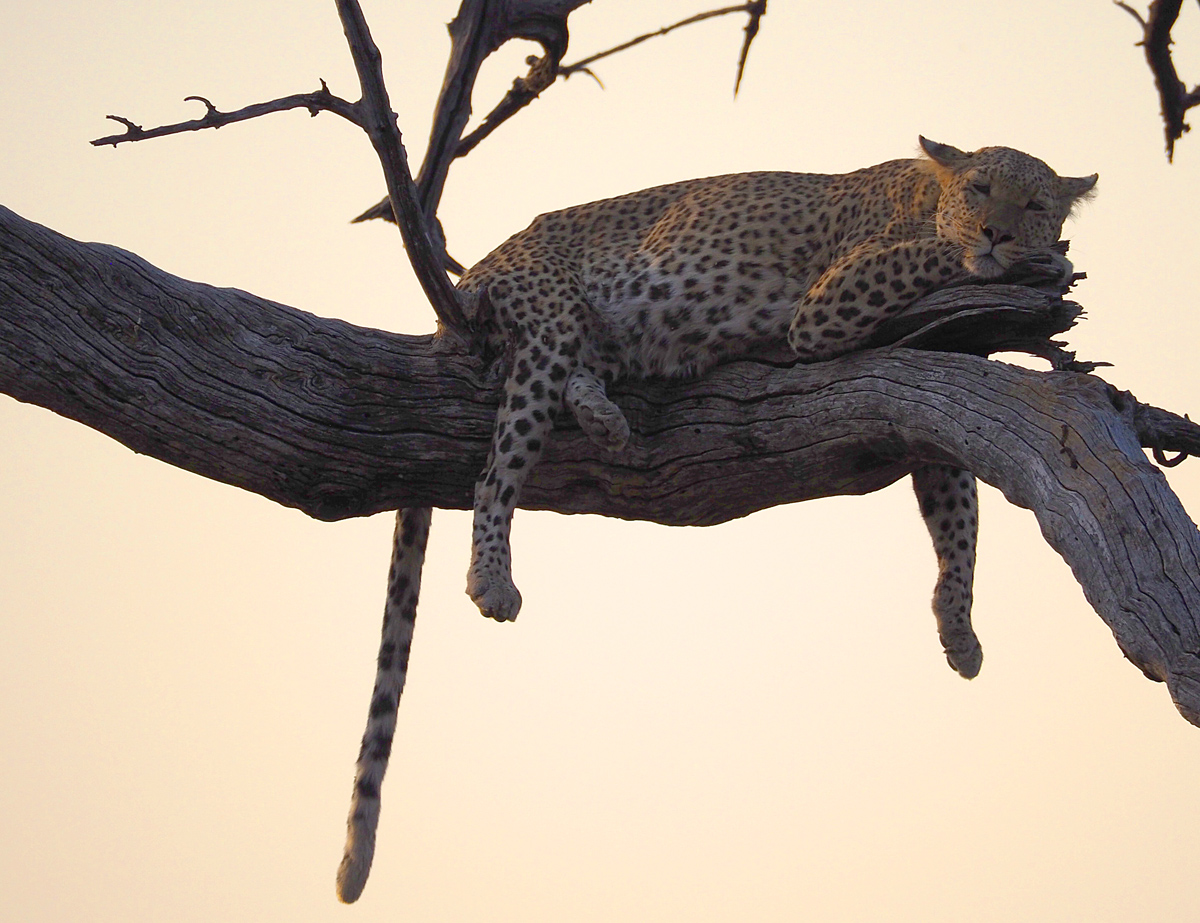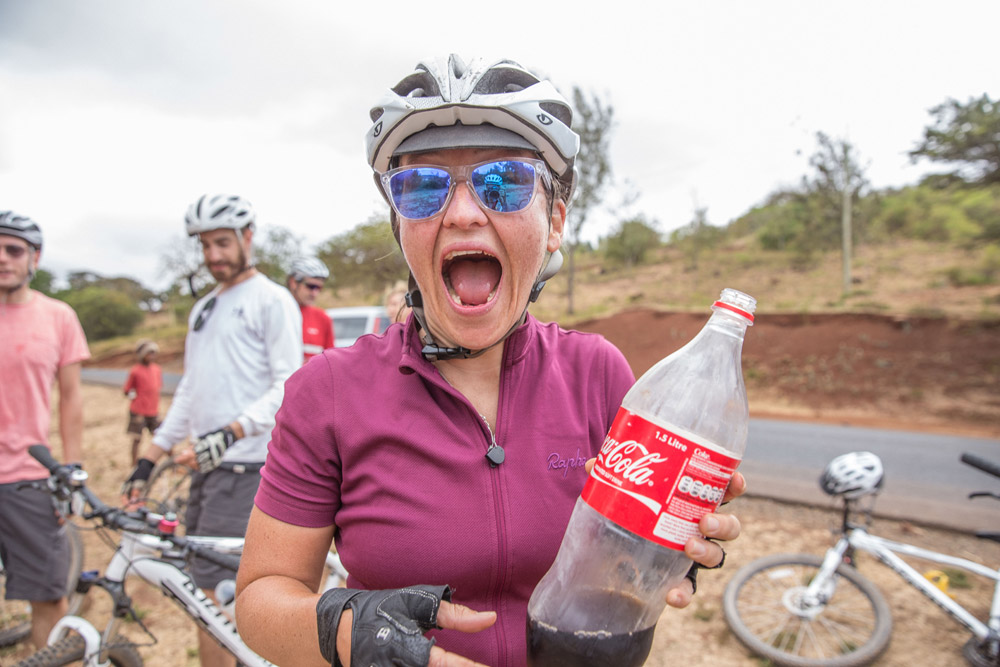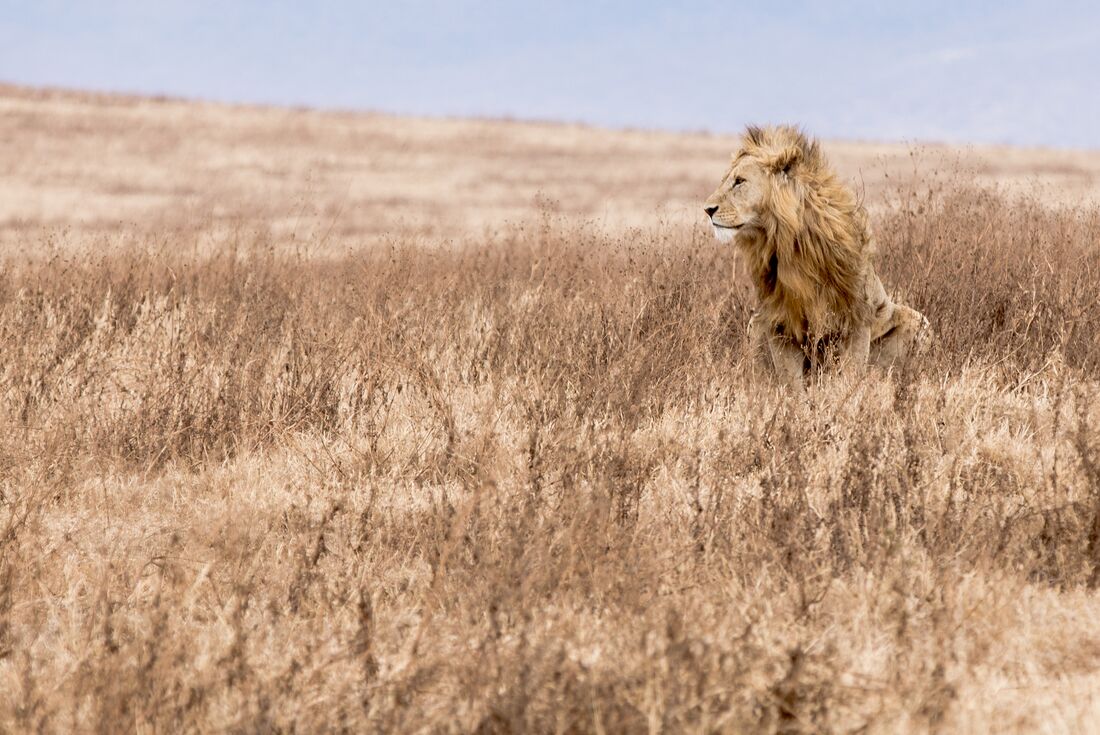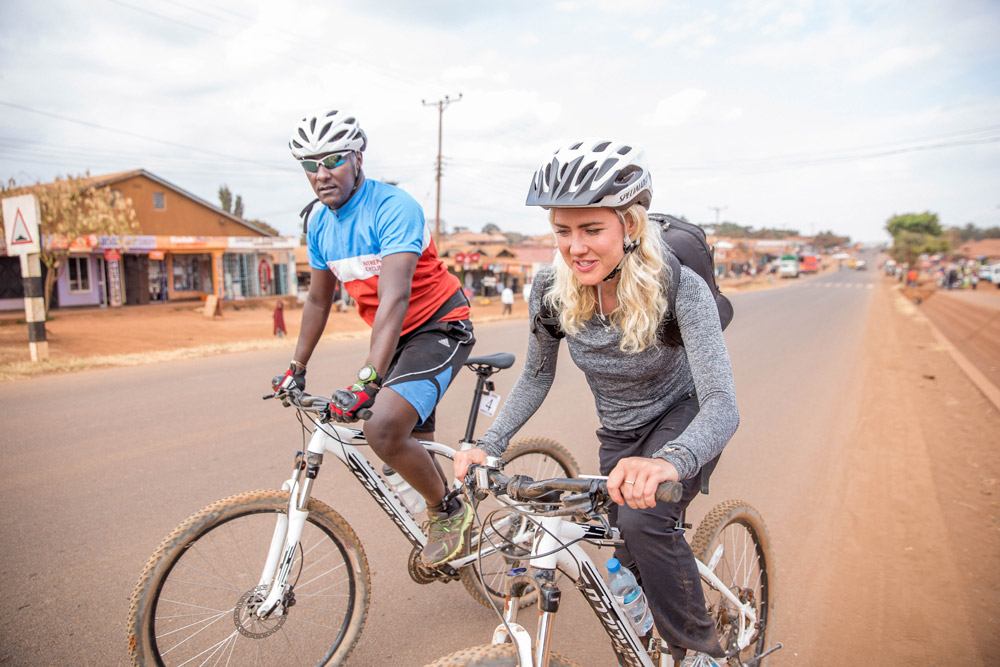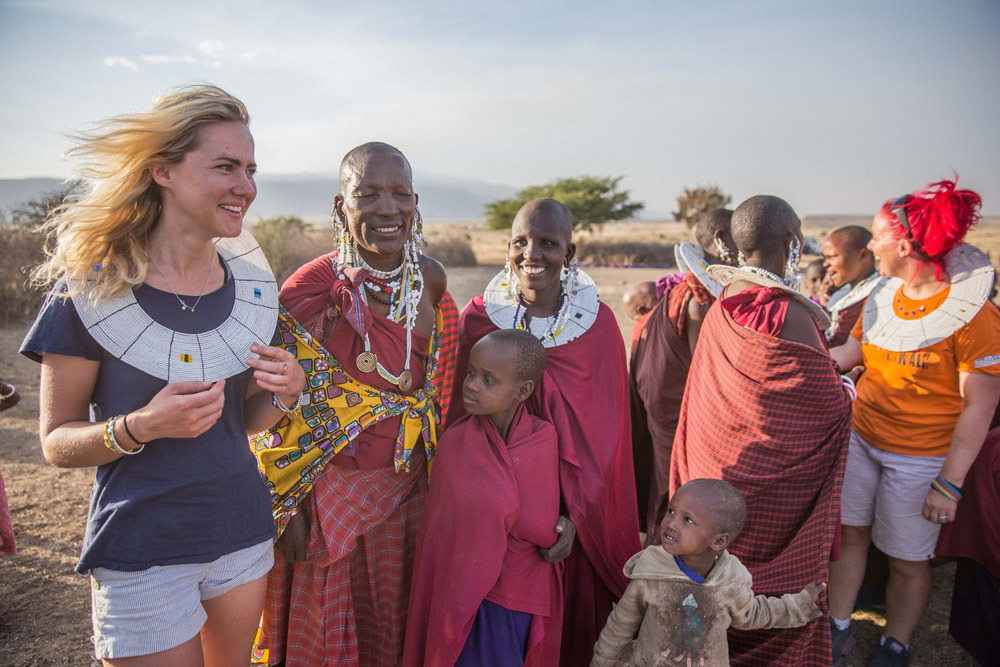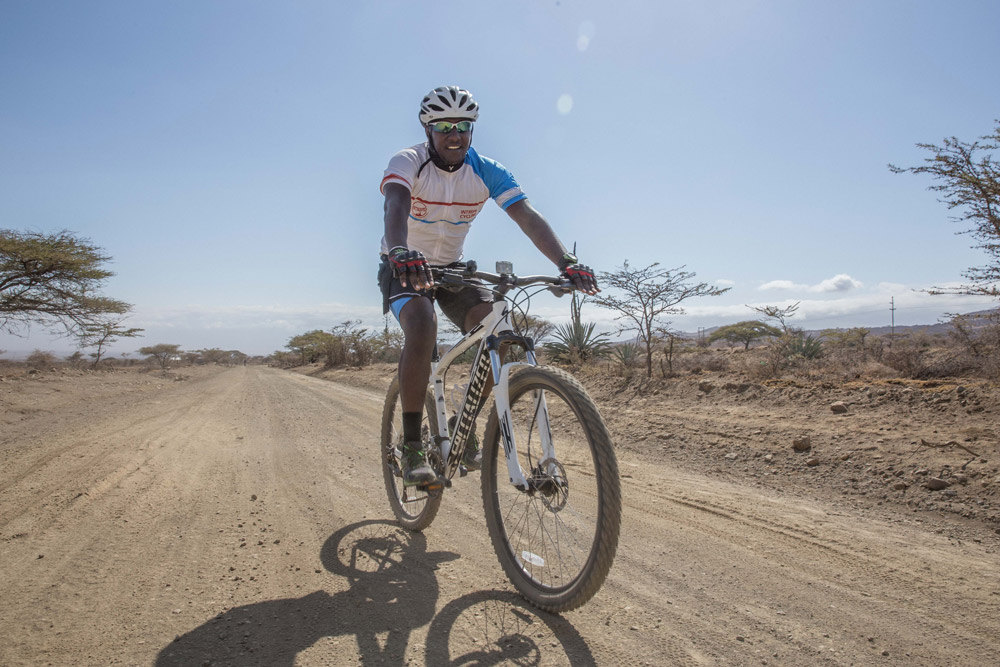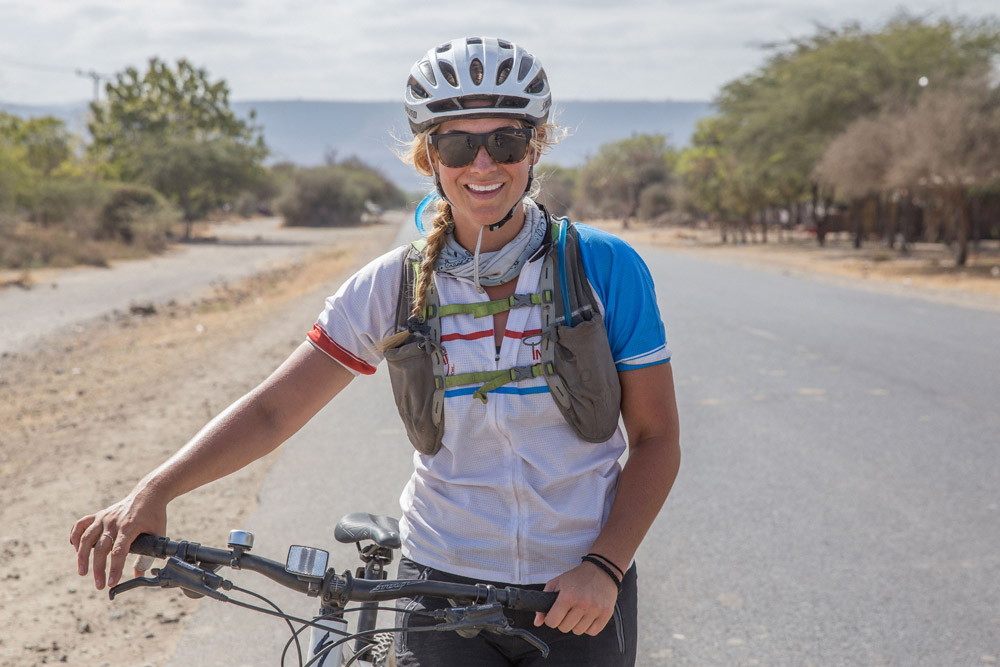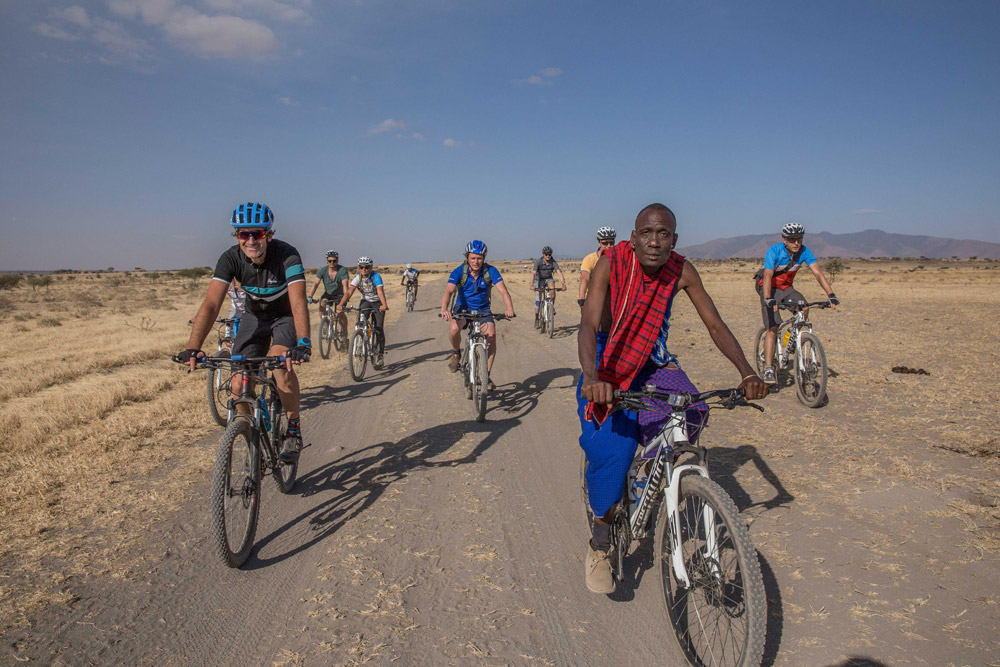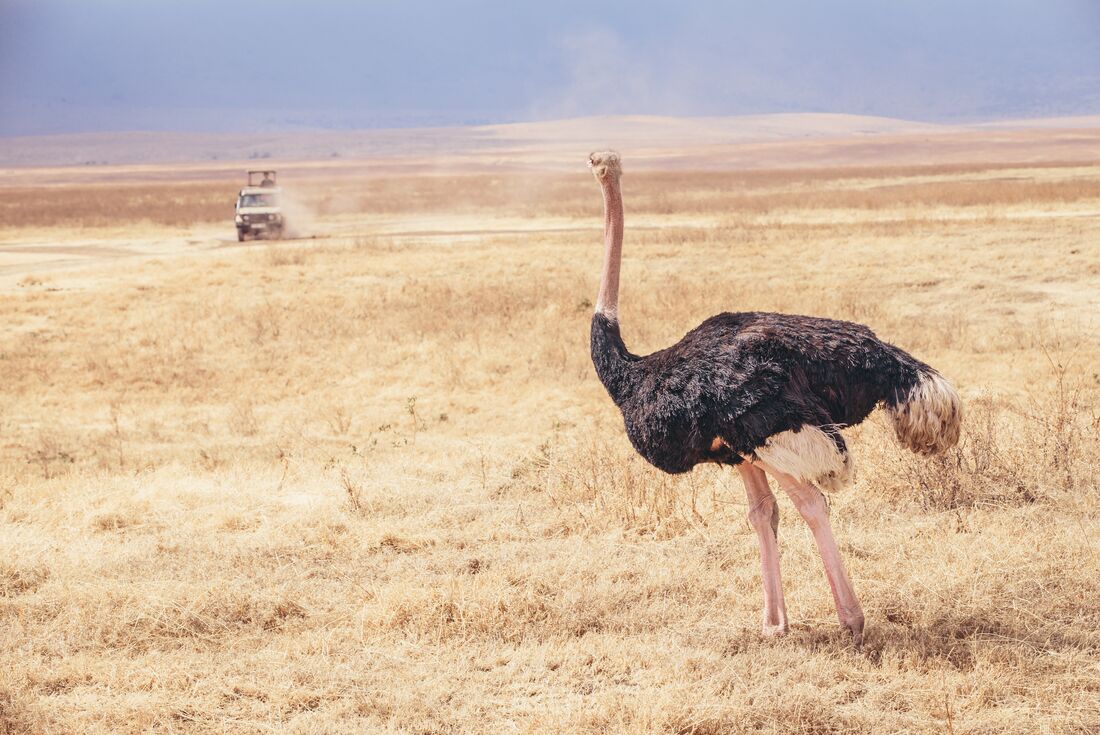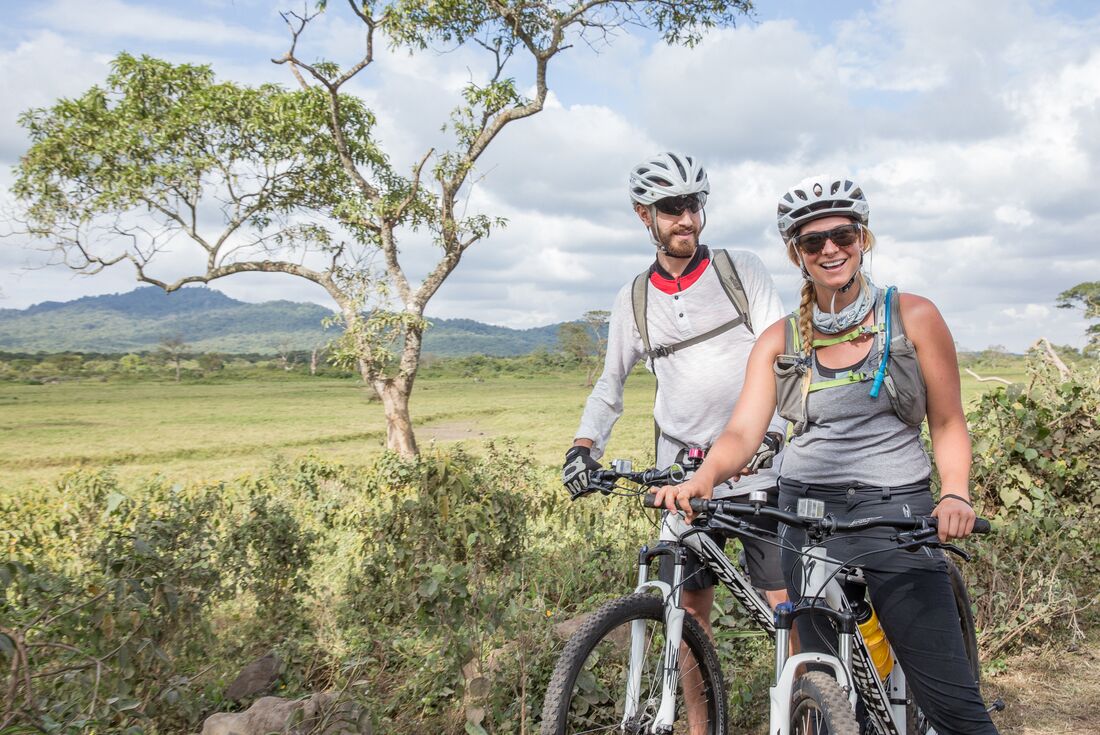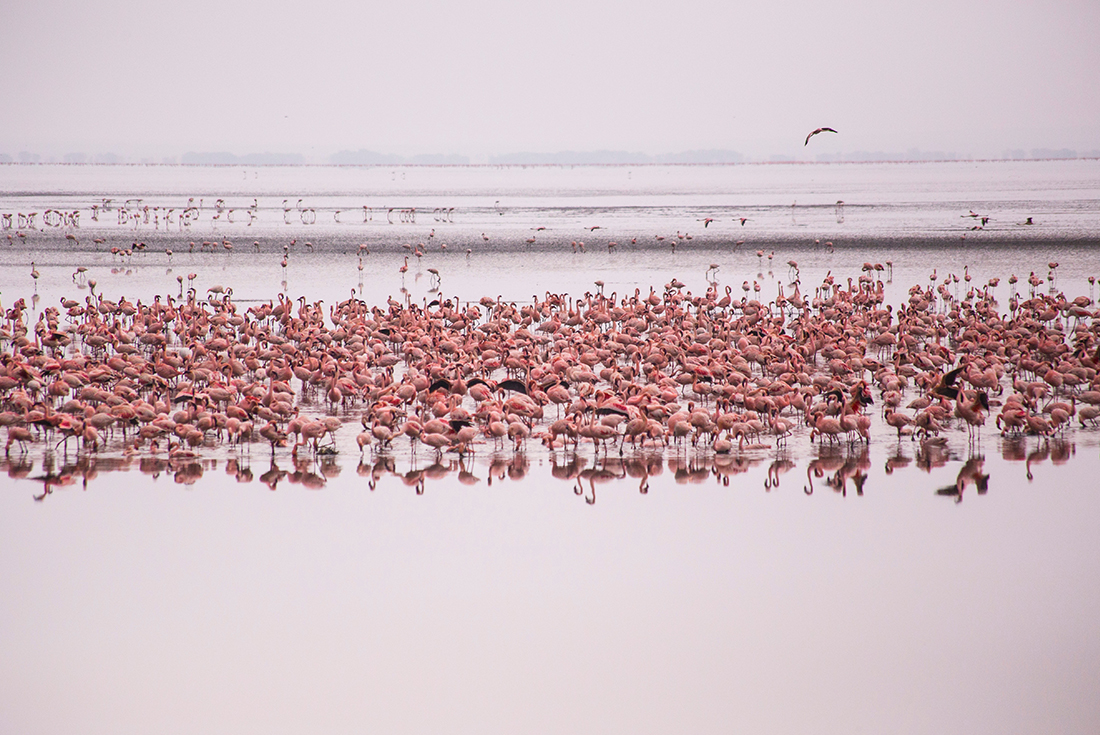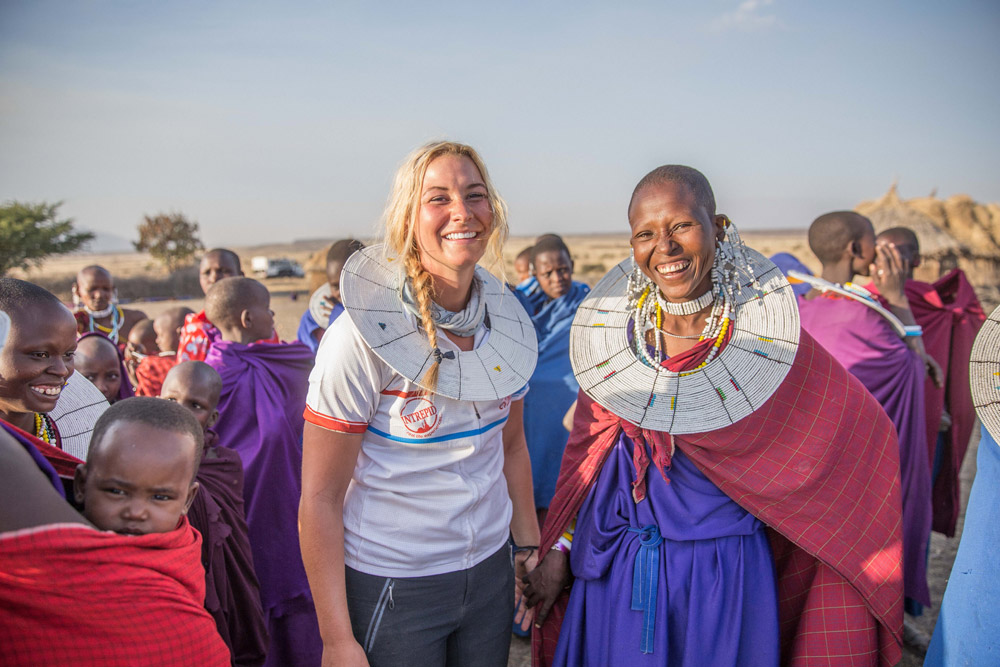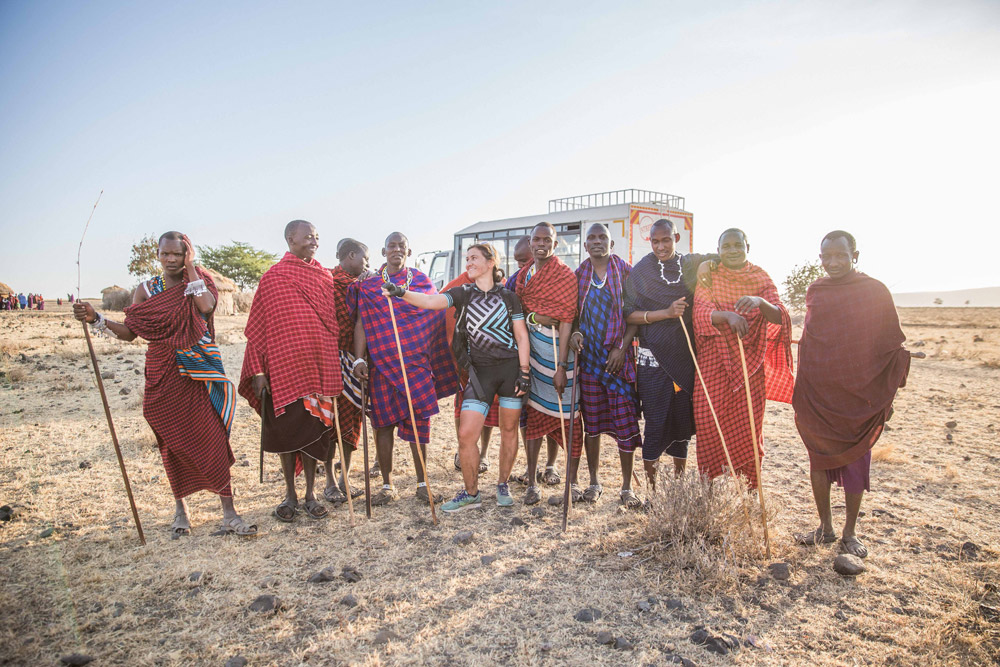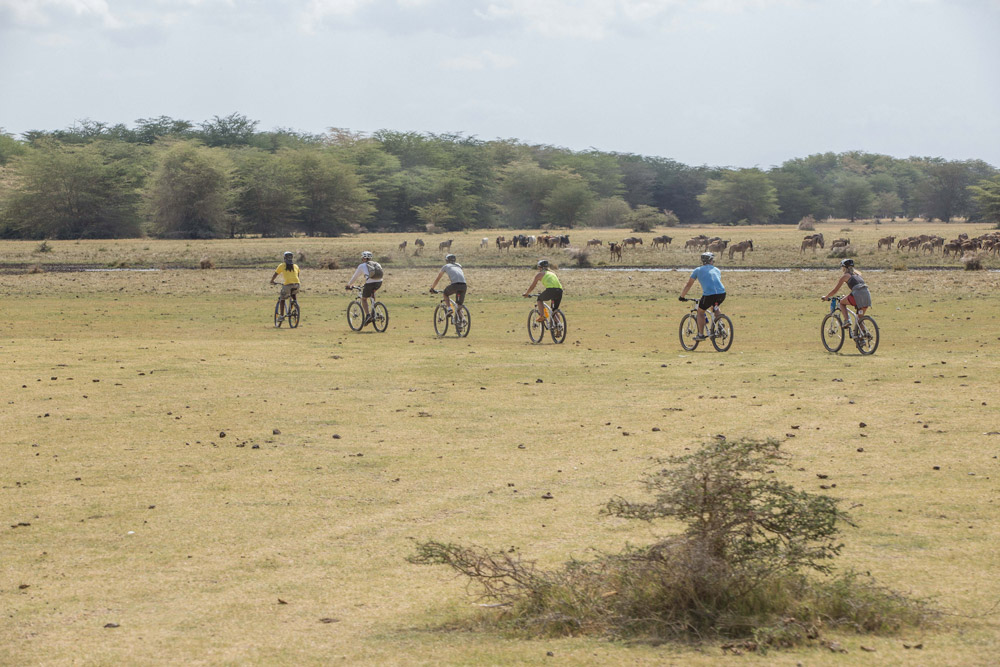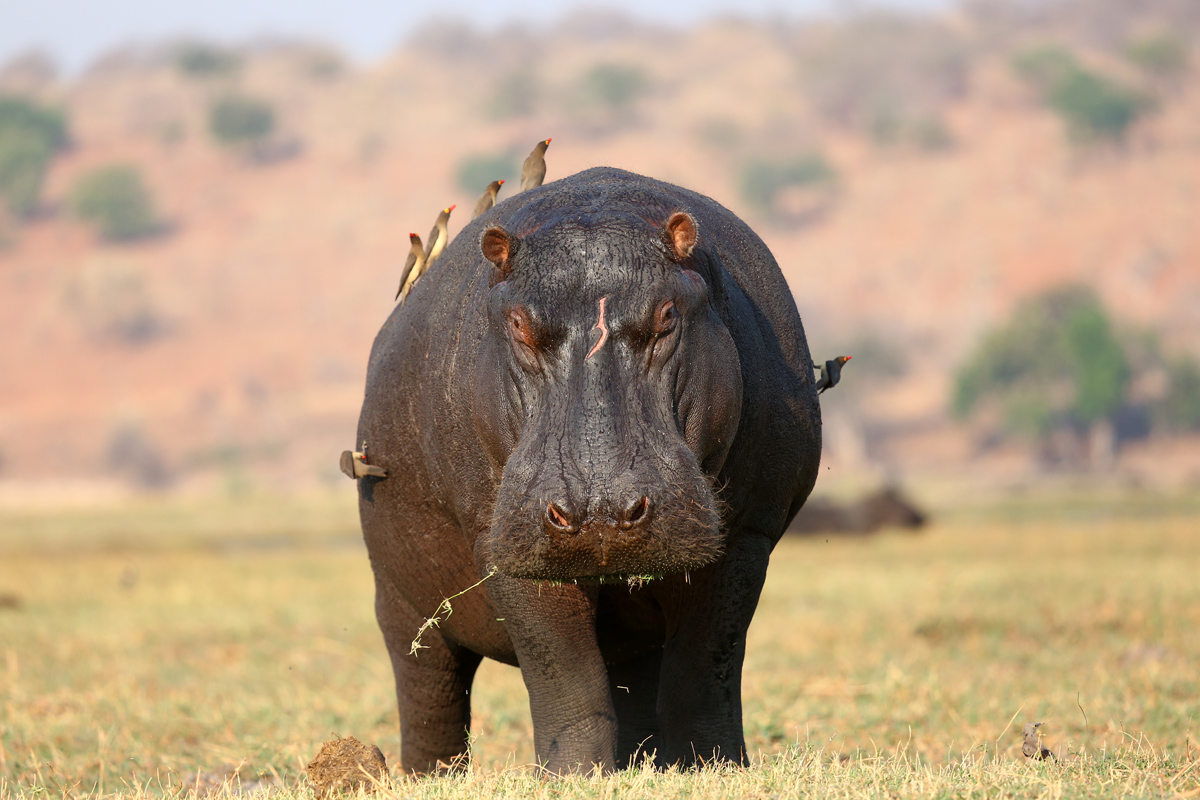- Get the best view of Tanzania’s landscapes from two-wheels – cycle in the shadow of Mount Meru in Arusha and ride alongside wildebeest in Lake Manyara.
- Refuel for the ride with a cup of Tanzanian coffee. Roast, grind and taste your own in the village of Tengeru and get a closer look at local farm life.
- Cycle where tourists rarely go, across the remote, barely charted plains of Lengai in the realm of vast grasslands and misty volcanic peaks.
- The Serengeti National Park and Ngorongoro Crater are two of Africa’s very best wildlife arenas. Fall asleep to the sounds of the African night and take a safari in search of the rare black rhino.
- Stretch your legs on an optional hike to the volcanic peak of Ol Doinyo Lengai, a challenging trek that will reward you with superb sunrise views.
04 Jul 2023
Cycle Tanzania
YTXC
Validity: 01 Jan 2023 to 31 Mar 2024
Brimming with mighty predators and birds, the Serengeti and Ngorongoro Crater are must-visits for any Tanzania trip, but safaris are only the beginning. This unique cycling adventure has you cruising down Great Rift Valley escarpments, strolling through farm villages, roasting and grinding your own coffee, drifting off to sleep among nocturnal creatures, experiencing the culture of the Maasai people, pedalling far off the beaten track to trails where no cars go, and of course sipping sundowners at sunset. With a support vehicle at every step of the journey, take your time to discover Tanzania on two wheels.
Basix
Cycling
Bicycle,Jeep,Overland vehicle (or 4WD jeep only for groups smaller than 5)
4
PHYSICAL PREPARATION There are regular rest breaks each day, however it is important to note that you will be riding over multiple and consecutive days in a climate and terrain that may be unfamiliar. While it can be tempting to start out riding as hard and fast as you can (we get it!) we recommend taking it easy on the first few days while your body gets used to the rides and the climate. As a general rule, the more preparation you can do for this type of trip, the more you will enjoy it. Prepare for the trip by doing aerobic type exercises before travelling - jogging or swimming are some options, though cycling is best. If possible take some extended day rides before travelling, or spend time on exercise bikes in the gym. The more your muscles (and bottom) are prepared for the riding on this trip the more you will be able to enjoy the wonderful countryside and people you meet while riding. Note that an enthusiasm for bike riding and adventure is essential! It is also important that you are both confident and competent in riding a bicycle, both solo and in a group environment. CYCLING DISTANCES: The information listed in the itinerary is a guide to the approximate distances and terrain cycled each day. However, this may vary depending on the physical capabilities of the group, and changes to local conditions. For safety reasons we only cycle during daylight hours, so there may be some early morning starts. We take regular rest breaks throughout cycling days. This is one of our tougher cycling trips, predominantly due to the heat and the general terrain and road conditions in Tanzania. The cycling distances are relatively short and the terrain of Tanzania can be hilly, so you'll need to be reasonably fit. While no specific technical riding skills are required we do ride on a mixture of sealed and unsealed/gravel roads which can be rough, and care should be taken especially on unsealed downhill sections. As such it is important that you are both confident and competent in riding a bicycle. If you are not used to riding on unsealed roads some practice at home before you travel is a great idea, especially for downhill sections. This trip has a single leader that rides with the group, and another that drives the support vehicle (acting as a back-marker where needed). It is not uncommon for the group to ride apart, especially on non-technical and flat sections. If you are feeling fatigued or are unsure of your cycling skills on any particular section you are always welcome to use the support vehicle at your discretion.
Venus Hotel
Plot No 15, Block D, Martine Street
Arusha
15113
TANZANIA, UNITED REPUBLIC OF
Phone: 255 27 254 7174
The Venus Hotel is located in the centre of Arusha. All rooms come with a private bathroom, air-conditioning and a flat-screen TV. Some rooms also offer mountain views and wifi is available at this property.
We are happy to arrange an arrival transfer for you at an additional charge from either Arusha Airport (ARK) or Kilimanjaro Airport (JRO). Please ask your booking agent if you would like to add this service and provide your flight details. FROM ARUSHA AIRPORT (ARK): Arusha Airport is the closest airport to the Venus Hotel. A taxi will take approximately 10 minutes and cost around USD$5. FROM KILIMANJARO AIRPORT (JRO): A taxi from Kilimanjaro Airport will take approximately 1 hour and cost around USD$25.
For trips departing on the following dates, use this joining point.
24 Sep 2023 (YTXC230924), 08 Oct 2023 (YTXC231008), 10 Dec 2023 (YTXC231210)
Lush Garden Hotel
Sakina Nairobi road - Arusha Opposite Hass Petrol Station
Arusha
TANZANIA, UNITED REPUBLIC OF
Phone: +255 787884466
We are happy to arrange an arrival transfer for you at an additional charge from either Arusha Airport (ARK) or Kilimanjaro Airport (JRO). Please ask your booking agent if you would like to add this service and provide your flight details. FROM ARUSHA AIRPORT (ARK): Arusha Airport is the closest airport to the Lush Garden Hotel. A taxi will take approximately 20 minutes and cost around USD$20. FROM KILIMANJARO AIRPORT (JRO): A taxi from Kilimanjaro Airport will take approximately 1 hour and cost around USD$80.
Venus Hotel
Plot No 15, Block D, Martine Street
Arusha
15113
TANZANIA, UNITED REPUBLIC OF
Phone: 255 27 254 7174
We are happy to arrange a departure transfer for you at an additional charge to either Arusha Airport (ARK) or Kilimanjaro Airport (JRO). Please ask your booking agent if you would like to add this service and provide your flight details. Alternatively your tour leader or the hotel staff can assist you with arranging a taxi. TO ARUSHA AIRPORT (ARK): Arusha Airport is the closest airport to the Venus Hotel. A taxi will take approximately 10 minutes and cost around USD$5. TO KILIMANJARO AIRPORT (JRO): A taxi to Kilimanjaro Airport will take approximately 1 hour and cost around USD$25.
For trips departing on the following dates, use this finish point.
24 Sep 2023 (YTXC230924), 08 Oct 2023 (YTXC231008), 10 Dec 2023 (YTXC231210)
Lush Garden Hotel
Sakina Nairobi road - Arusha Opposite Hass Petrol Station
Arusha
TANZANIA, UNITED REPUBLIC OF
Phone: +255 787884466
We are happy to arrange a departure transfer for you at an additional charge to either Arusha Airport (ARK) or Kilimanjaro Airport (JRO). Please ask your booking agent if you would like to add this service and provide your flight details. Alternatively your tour leader or the hotel staff can assist you with arranging a taxi. TO ARUSHA AIRPORT (ARK): Arusha Airport is the closest airport to the Venus Hotel. A taxi will take approximately 10 minutes and cost around USD$20. TO KILIMANJARO AIRPORT (JRO): A taxi to Kilimanjaro Airport will take approximately 1 hour and cost around USD$80.
1. A single supplement is available if you’d prefer not to share a room on this trip. The single supplement applies to all nights of your trip and is subject to availability. Please speak to your booking agent for further information. 2. Bicycle hire is included in your trip price. Please advise your height at time of booking so as we can organize a suitable sized bike. 3. Bike helmets are compulsory on this trip. We are unable to hire bike helmets locally so please ensure you bring your own bike helmet from home. 4. On this trip we have a single leader that rides with the group, and another that drives the support vehicle (acting as a back marker where needed). Where the vehicle cannot travel directly with the cyclists (e.g., a cyclists-only path) your leader will assign a person from the group to act as a back marker. 5. To help cut carbon emissions and increase comfort, for group of 4 or less travellers we will use private 4WD jeeps rather than a large overland trucks. 6. For groups of 4 or less we stay in permanent tents rather than participatory camping. 7. Due to heavy rainfalls making the mountain hiking trails far more technical than usual we have suspended climbing Mt Ol Doinyo Lengai. We will assess the situation on a trip-by-trip basis but please be aware you may not be able to climb the mountain.
All Intrepid cycling group trips are accompanied by one of our cycling leaders. The aim of the group leader is to take the hassle out of your travels and to help you have the best trip possible. Intrepid endeavours to provide the services of an experienced leader however, due to the seasonality of travel, rare situations may arise where your leader is new to a particular region or training other group leaders. Our cycling leaders are all passionate cyclists, as you’d expect, but they also go through some pretty rigorous cycle-trip specific training. Each one has undergone on-road training and supervision and knows how to do safety checks, basic repairs and emergency first-aid. And at the end of the day they’re still regular Intrepid leaders, which means they will provide information on the places you are travelling through, offer suggestions for things to do and see, recommend great local eating venues and introduce you to our local friends. While not being guides in the traditional sense you can expect them to have a broad general knowledge of the places visited on the trip, including historical, cultural, religious and social aspects. At Intrepid we aim to support local guides who have specialised knowledge of the regions we visit. If you were interested in delving deeper into the local culture at a specific site or location then your leader can recommend a local guide service in most of the main destinations of your trip.
We take safety seriously on all our trips, but cycling tours deserve a few special considerations. HELMETS: Helmets are compulsory and we do not allow anyone to ride without one (including our own staff!). You can bring your own, or purchase one that meets international safety standards on the ground. Your leader can assist with this. FOOTWEAR For safety reasons we strongly recommend that you wear shoes that cover the toes while riding. SUPPORT VEHICLES We usually have a support vehicle following us if first-aid is ever necessary or people are feeling too tired to ride. BIKES: Our bikes are serviced regularly, and we get them checked by experts before each and every trip. Should you choose to bring your own please note that while we are happy to assist where we can with repairs you are responsible for the safety and suitability of your own equipment. TRAFFIC AND DRIVING ON THE OTHER SIDE OF THE ROAD: Depending on where you come from please note that drivers in this part of the world may drive on the opposite side of the road from what you are used to. Look both ways before crossing any road. Traffic can be a little more chaotic than you might be used to at home. Be aware! There are times when traffic conditions make sections of our planned riding route unsafe – in this instance we will use the support vehicle. WEATHER Due to inclement weather posing a serious health or safety issue there may be times when we use the support vehicle instead of doing the planned ride. We will endeavour to reroute if possible but at times may have to cancel the planned ride.
On this trip we have a single leader that rides with the group, and another that drives the support vehicle (acting as a back marker where needed). Where the vehicle cannot travel directly with the cyclists (e.g. a cyclists-only path) your leader will assign a person from the group to act as a back marker to help ensure that the group stays together.
Tanzania is a large country and thus the climate varies within it. However, generally the main rainy season, or the 'long rains', occur during March, April and May. Afternoon tropical downpours are usual – which are heavier and more predictable beside the coast and on the islands. The humidity is high and daily temperatures reach the low-mid 30°Cs. The long dry season occurs during June, July, August, September and October, when rainfall is unusual. Temperatures vary hugely with altitude and location, but it's usually a clear sky and sunny weather. During November and December there's another rainy season: the 'short rains'. These are much lighter than the main rains and less reliable. If it has rained during the short rains, then it normally dries up for a few months, January and February, which is Tanzania's 'short dry season', before starting to rain again in March.
Many national governments provide a regularly updated advice service on safety issues involved with international travel. We recommend that you check your government's advice for their latest travel information before departure and ensure that your travel insurance covers you for all areas your itinerary covers. Please refer to our website's safety page for links to major travel advisories and updates on safety issues affecting our trip. We strongly recommend the use of a neck wallet or money belt while travelling, for the safe-keeping of your passport, air tickets, cash and other valuable items. Leave your valuable jewellery at home - you won't need it while travelling. Many of our hotels have safety deposit boxes, which is the most secure way of storing your valuables. A lock is recommended for securing your luggage. Your leader will accompany you on all included activities, however during your trip you'll have some free time to pursue your own interests, relax and take it easy or explore at your leisure. While your leader will assist you with the available options in a given location, please note that any optional activities you undertake are not part of your Intrepid itinerary, and Intrepid makes no representations about the safety of the activity or the standard of the operators running them. Please use your own good judgement when selecting an activity in your free time. Please also note that your Leader has the authority to amend or cancel any part of the trip itinerary if it's deemed necessary due to safety concerns. For more details on the type of conditions and safety standards you can expect on your trip, please refer to Intrepid's operational safety policy on our website. We recommend that you take a moment to read through this information before travelling, and would appreciate any feedback on how well it's being implemented in the field: www.intrepidtravel.com/safety-guidelines
FIRE PRECAUTIONS Please be aware that local laws governing tourism facilities in this region differ from those in your home country and not all the accommodation which we use has a fire exit, fire extinguishers or smoke alarms. BALCONIES Some hotel balconies don't meet western standards in terms of the width of the balcony fence being narrower than 10cm. TRAFFIC AND DRIVING ON THE OTHER SIDE OF THE ROAD Depending on where you come from please note that drivers in this part of the world may drive on the opposite side of the road from what you are used to. Look both ways before crossing any road. Traffic can be a little more chaotic than you might be used to at home. Be aware! SEAT BELTS Please be aware that local laws governing transportation safety may differ from those in your home country and not all the transport which we use is able to provide seat belts. PICK POCKETING & PERSONAL SAFETY While travelling there is always the risk of pick-pocketing and petty theft, particularly in the more touristy cities. We recommend that you exercise caution when walking at night and encourage you to walk in groups and only on main, well-lit thoroughfares. Be particularly vigilant on public transport. Simple measures like carrying your day pack on your front, not hanging your bag over the back of your chair or on the floor and wearing a money belt will reduce any chance that your valuables should go missing. WATER SAFETY Please take care when taking part in any activities in the ocean, river or open water, where waves and currents can be unpredictable. It's expected that anyone taking part in water activities is able to swim and have experience in open water. All swimmers should seek local advice before entering the water. TRAVEL ADVICE & TRAVEL INSURANCE We recommend that you check your government's advice in relation to the areas you will be visiting for their latest travel information before departure and ensure that your travel insurance covers you for all areas your itinerary covers.
HOMOSEXUALITY IN TANZANIA Homosexuality is illegal in Tanzania (including Zanzibar) and is not tolerated in Tanzania’s conservative society. Public displays of homosexuality like holding hands or kissing in public places could lead to arrest and up to 30 years’ imprisonment. In June 2017, the Tanzanian Government announced a 'crackdown' on LGBQTI rights advocates operating in Tanzania, threatening arrest. We recommend that you refer to your government's official travel advisories for the most up to date advice before you travel.
PASSPORT You’ll need a valid passport to travel internationally and most countries require your passport to have a minimum of 6 months validity, so remember to check the expiry date. We need your passport information to get everything ready for your trip so it’s important that the information on your booking matches your passport exactly. Please take care to provide the correct details. We recommend carrying a copy of the photo page of your passport while travelling and leaving a copy at home with family or friends. VISAS Many countries require a visa and obtaining the correct visa is your responsibility. We recommend you check your visa requirements as soon as you have booked your trip. This will ensure you have time to prepare your documents and for your visa application to be processed. Entry requirements can change and are different depending on your nationality. Please refer to your government's foreign travel advisories, the consular websites for the countries you’re travelling to and those you may transit through. Always follow visa advice from official websites; not all visa information found online may be valid. You can also head to Intrepid’s Entry & Health requirement page to get the latest information on travel documents and visa requirements, plus local government COVID-19 vaccination and quarantine policies: https://www.intrepidtravel.com/au/visa-health-requirements TANZANIA: It is possible to obtain a tourist visa for a single entry at any one of the following main entry points to Tanzania, subject to the fulfilment of all immigration and health requirements for approximately USD$50 in cash (post 2006 USD): -Dar es Salaam International Airport -Zanzibar International Airport -Kilimanjaro International Airport (KIA) -Namanga Entry Point (Tanzania-Kenya border point) -Kasumulu Border crossing -Isebania Border crossing (Sirari Border) Alternatively you will need to purchase your visa in advance at any Diplomatic or Consulate Mission of the United Republic of Tanzania abroad. The cost is approximately USD100 depending on nationality and should take one business day. At the present time you do not require a multi entry visa to Kenya, Tanzania and Uganda due to an agreement between the three countries (i.e. if you exit Kenya to Tanzania you can re-enter Kenya on the same visa). However if your trip visits Tanzania twice after a visit to a country other than those listed above, you may need to purchase two visas. Visa processes at both Kilimanjaro International Airport and land border crossings can take some time so we recommend all travellers obtain a visa in advance. If obtaining a visa on arrival at Kilimanjaro International Airport you will be required to: o Queue for a Government Control Number o Queue to pay for this at the bank o Queue for Immigration to check and issue the visa For the purpose of Tanzania visa application you can use the following address: Kibo Palace Hotel PO Box 2523 Old Moshi Road Arusha - Tanzania Phone: +255 272544472
Get the best view of Tanzania’s landscapes from two-wheels – cycle in the shadow of Mount Meru in Arusha and ride alongside wildebeest in Lake Manyara.
Refuel for the ride with a cup of Tanzanian coffee. Roast, grind and taste your own in the village of Tengeru and get a closer look at local farm life.
Cycle where tourists rarely go, across the remote, barely charted plains of Lengai in the realm of vast grasslands and misty volcanic peaks.
The Serengeti National Park and Ngorongoro Crater are two of Africa’s very best wildlife arenas. Fall asleep to the sounds of the African night and take a safari in search of the rare black rhino.
Stretch your legs on an optional hike to the volcanic peak of Ol Doinyo Lengai, a challenging trek that will reward you with superb sunrise views.
To complete this trip, it is important that you are both confident and competent in riding a bicycle. On this trip we have a single leader that rides with the group, and another that drives the support vehicle (acting as a back-marker where needed). Where the vehicle cannot travel directly with the cyclists due to cyclist-only paths, your leader will assign a person from the group to act as a back-marker. The cycling distances are mostly short, but the roads can be rough, and the terrain of Tanzania can be hilly and the climate warm, so you'll need to be reasonably fit. Keep in mind the support vehicle will be on hand if you need a break. Riding is done along both sealed and unsealed roads, but there are no special technical skills needed. Some practice at home is a great idea, however, especially for downhill sections. This trip involves a partial camping experience, giving you access to more remote destinations at close proximity, and the joy of experiencing the elements. This is a participatory trip – a fancy way of saying you’re not just along for the ride, but you are part of a team! Be prepared to roll up your sleeves and help out with camp activities like food prep and washing up. It’s all about giving your new travel mates a hand, and everyone knows there’s nothing worse than trying to put up a tent on your own!
GENERAL HEALTH All travellers need to be in good physical health in order to participate fully on this trip. When selecting your trip please make sure you have read through the itinerary carefully and assess your ability to manage and enjoy our style of travel. Please note that if in the opinion of our group leader or local guide any traveller is unable to complete the itinerary without undue risk to themselves and/or the rest of the group, we reserve the right to exclude them from all or part of a trip without refund. You should consult your doctor for up-to-date medical travel information or for any necessary vaccinations before departure. We recommend that you carry a first aid kit as well as any personal medical requirements in their original packaging as they may not easily be obtained while travelling. COVID-19 The safety and wellbeing of our travellers, leaders, crew, staff, and suppliers continues to remain our highest priority as we travel. You can read more about how we will keep you safe on our trips, including our COVID-19 Health & Safety Guidelines here: https://www.intrepidtravel.com/safe-travels VACCINATION POLICY From 1 January 2023, Intrepid will no longer require travellers to provide proof of vaccination against COVID-19 for this trip. However, we continue to strongly recommend that all travellers get vaccinated to protect themselves and others. Specific proof of testing or vaccination may still be required by your destination or airline. Please ensure you check travel and entry requirements carefully. For more information, including a detailed FAQ about this policy, please visit https://www.intrepidtravel.com/covid19. HEALTH SCREENING If you are unwell prior to travelling, please stay at home and contact us to make alternative arrangements. From 1 January 2023, Intrepid will no longer require travellers to complete a self-screening health form at the group meeting for this trip. If you are displaying any COVID-19 symptoms or have any health concerns during the trip, we will follow the advice of local health authorities to determine whether medical assistance, isolation or further action is required. Travellers who test positive while taking part in an Intrepid trip will need to leave the group for a minimum of five days and may only rejoin the group if presenting as asymptomatic – our team will assist them in arranging a place to self-isolate and any onward journey. It's quite possible that the destination country may have different or more strict protocols than your home country regarding COVID-19. This may include hotel or hospital quarantine or quarantine for the group. Please check your government's travel advice or contact the closest embassies to find out the details. We ask all travellers to continue to monitor their health throughout their travels and report any relevant symptoms to their tour leader. YELLOW FEVER: A valid international certificate of vaccination against Yellow Fever is required in many countries if you are arriving from a country with risk of yellow fever (eg. Kenya). You may need to present this on arrival at the airport or border crossing. Some countries will refuse entry if you are unable to present your certificate. It's also quite common for your home country to request a Yellow Fever certificate on your arrival back home. It is your responsibility to check with your doctor well in advance of leaving home about the Yellow Fever requirements for the countries you'll be visiting. DRINKING WATER As a rule we recommend you don't drink tap water, even in hotels, as it may contain much higher levels of different minerals than the water you are used to at home. For local people this is not a problem as their bodies are used to this and can cope, but for visitors drinking the tap water can result in illness. Generally this isn't serious, an upset stomach being the only symptom, but it's enough to spoil a day or two of your holiday. Many hotels and lodges provide safe drinking water, while bottled water is another alternative. Water consumption should be about two litres a day. Rehydration salts, motion sickness tablets, and diarrhoea blockers are available from many pharmacies. CYCLING HEALTH Riding across unfamiliar terrain in weather conditions that you are not used to can potentially lead to cycling-related health issues. By far the most common issue is that of dehydration. While this is most common on warm/hot days, it is also a factor during cold weather as you continue to sweat. Research shows most riders will typically lose 500-1000 ml of water per hour. While we schedule in frequent rest stops and encourage you to refill water bottles at every opportunity, it is the responsibility of each cyclist to monitor their own levels of hydration while cycling. The key point to remember is not to wait until you’re thirsty but to drink small amounts regularly from the start of your ride. Adding an electrolyte solution can aid in replenishing the salts/electrolytes lost through physical activity. This is especially important on days when you are drinking a lot of the bike.
Your group leader will endeavour to cater for specific dietary requirements where possible, and vegetarianism and gluten intolerance will be catered for in most instances. Please notify your group leader of any dietary requirements in your group meeting at the start of the trip. For those suffering from particular food allergies, your group leader will endeavour to disclose to their fullest knowledge the main ingredients in dishes being consumed. It is, however, your personal responsibility to ensure that you do not ingest any foods to which you are allergic. Alcoholic or non-alcoholic beverages are not part of included meals.
When it comes to money matters on the trip, every traveller is a little different. You know your spending habits better than we do, so please budget a sensible amount for things like meals not included, drinks, shopping, optional activities, tipping and laundry. It’s always better to bring a little more than you think you’ll need. Also make sure you’ve read your trip details thoroughly so you know what’s included in the trip price and what isn’t. This should make budgeting a little easier. You’ll find this info in the Inclusions section of your Essential Trip Information (that’s this document). Please note: all recommendations for additional costs, tipping etc. are in USD. You will need to convert these into the relevant local currency. MEALS NOT INCLUDED For lunches not included, a budget of USD10 to USD15 per meal will be more than sufficient. For dinners not included, your leader will normally recommend options and restaurants where you can safely try the local specialties of the region. Expect meals to cost between USD12 to USD25 for a main. These are indicative prices only. If you are in a tight budget or are happy to try local food, you can eat cheaper than this. If you want to try just the finest food at the finest restaurants, then you can expect meals to cost as much as in western countries. TIPPING Gratuities aren’t compulsory on your trip, but they can make a big difference to locals employed in the tourism industry. If you are happy with the services provided, a tip is an appropriate way to thank them. While it may not be customary to you, it is of great significance to the people who will take care of you during your travels, inspires excellent service, and is an entrenched feature of the tourism industry across many Intrepid destinations. A budget of around USD7 to USD14 per traveler, per day is typically sufficient to cover all tipping expenses. TIPPING GUIDE To give you a bit of guidance, we’ve put together the following tipping notes. These are just suggestions, based on feedback from past travellers and our staff on the ground. - Your crew (including leaders, drivers and cooks where applicable) – The amount is entirely a personal preference; however as a guideline USD2 to USD4 per staff member, per day can be used. Of course you are free to tip more or less as you see fit, depending on your perception of service quality and the length of your trip. Remember, a tip is not compulsory and should only be given when you receive excellent service. - Local guides – Throughout your trip you may at times have a local guide in addition to your leader. We suggest around USD2 per person, per day for local guides. - Basic restaurants – When checking the bill, if there’s an addition of 10% service charge, there’s no requirement for tipping. Otherwise, 10% of the total bill amount is appropriate. TIPPING KITTY Over the years we have found that many of our travellers find the need for tipping to be both tiresome and embarrassing, especially if they don't have the correct small change. To overcome this, your leader might raise the idea of a group tipping kitty. At your group meeting, your tour leader may discuss the idea of running this kitty, whereby everybody contributes an equal amount and then your tour leader pays the tips as you go. The leader will keep a running record of all monies spent (except restaurant tips). The record can be checked at any time and any money remaining at the end of the tour returned to group members. This kitty does not include tips for your leader and crew. EMERGENCY FUNDS We try to plan for every eventuality, but there are still some things beyond our control. Please make sure you bring an extra USD500 for emergencies (e.g. natural disasters or civil unrest). Sometimes these things necessitate last minute changes to our itineraries, and we can’t guarantee there won’t be some extra costs involved. CREDIT CARDS, ATMS AND MONEY EXCHANGE: Credit cards are generally accepted in tourist shops and some restaurants across Africa. Visa and Mastercard are generally preferred over American Express, Diners, etc. Smaller venues take cash only. Foreign currency is easily changed at exchange bureaus and they generally offer the best rates. With ATMs being increasingly available in the many major towns and cities and even some campsites, credit or debit cards are a convenient way to access money. Be aware that your withdrawing limit may vary from country to country (regardless of your withdrawing limit in your home country) and it can be as low as the equivalent to USD100 per day. Throughout Africa, cards with the Visa logo are most readily recognised, although MasterCard is also accepted in most places. A charge is made for each international transaction - please check with your bank how much this fee will be. Check with your bank before leaving home that your card can be used as a debit card in Africa. You may also want to notify your bank that you are visiting Africa as it's not unknown for banks to freeze cards which show sudden transactions in other countries. If you're on a multi-country tour, your tour leader will be able to give you an approximate idea of how much money you may need for your stay in each country. PLEASE NOTE: Many businesses and banks in Africa, especially East Africa, do not accept US dollar notes older than 2006. If you are bringing USD, we strongly recommend large bills in good condition, 2006 series onwards only. Any old or damaged notes may not be accepted. MEALS NOT INCLUDED: approx. USD 150
Packing for a cycling tour isn’t that different from any other adventure. But if you want to be comfortable and warm, here are a few bike-specific tips. • Helmet – these are compulsory, but if you don’t have your own you can sometimes purchase an approved and well-fitted one at the start of the trip (our leaders can assist you with this). There are some destinations where you are unable to purchase or hire appropriate helmets locally so you will need to bring your own - please check the 'Important Notes' section to see if this is the case. • Padded bike shorts • Quick-dry jerseys – you can definitely get away with a few cotton t-shirts but having a few light and breathable jerseys will make your cycling a lot more comfortable, especially in warmer/humid climates. • Quick-dry socks • Cycling gloves – not essential but recommended as padded cycle gloves will make your riding more comfortable and can help protect you in case of a fall. • Rain gear – pack a light poncho in case the weather turns when you’re out on the road • Light breathable waterproof/windproof – especially useful for those early mornings or downhill sections when the wind-chill becomes a factor. • Water bottle – we don't provide bottles but all our bikes have one bottle holder fitted (and a second one can be fitted if required). Please bring a cycling-specific water bottle as other types will fall out of the holders. A Camelbak will make drinking on-the-go easier. • Sunglasses – well fitted sports sunglasses help protect against dust, insects and (of course) the sun • Day pack – our support vehicle will carry your main bag, but a day pack for snacks and clothes is a good idea. • Suncream – please bring a high protection factor (e.g. SPF 50) sunscreen as long days in the saddle can really expose you to the sun • Shoes – normal sports shoes can be worn on all of our trips however you may want to consider a flat shoe with a relatively stiff sole as it makes pedalling a lot more efficient. Regular cyclists are welcome to bring their own cycling-specific shoes however we recommended 'mountain bike' style shoes that have grip on the sole rather than road bike' shoes as you will still be walking around while on the rides (cafe/photo/toilet stops, etc.). For safety reasons we require that you wear shoes that completely cover the toes while riding. • Saddles – are saddles are standard, unisex models –less experienced cyclists may choose to bring your own gel seat cover for added comfort. Regular cyclists are welcome to bring your own saddle – our leader will assist in fitting it to your bike • Pedals – all bikes come with flat pedals. Regular cyclists are welcome to bring their own pedals – our leader will assist in fitting them to your bike As space in our support vehicle/transport can be limited we request that you bring only a small luggage bag with you rather than larger bags or suitcases.
What you need to bring will vary according to the trip style you have chosen, the countries you are visiting and when you are travelling. Generally speaking, we recommend you pack as lightly as possible and make sure that you are able to carry and lift your own luggage, and walk with it for short distances. Most travellers carry their luggage in a backpack, although an overnight bag with a shoulder strap would suffice if you travel lightly. Smaller bags or backpacks with wheels are convenient although we recommend your bag has carry straps. You'll also need a day pack/bag to carry water and a camera etc for day trips. Below are some ideas and helpful tips on what you specifically need for this trip. ESSENTIALS: - Sleeping bag. We recommend a 3–4 season sleeping bag because it can get very cold at night in winter months in desert and mountainous regions. Sleeping bags are also available for hire (if pre-booked). Please speak to your sales consultant, at least 14 days prior to departure, if you wish to hire one. - Pillow or travel pillow. - Closed in shoes. As this trip includes camping and/or bush walking we highly recommend that you take a pair of comfortable, closed-in walking shoes. Closed-in shoes will help to protect your feet from cuts and scratches when walking through bush/grass-lands, and will also act as a barrier protection in rare cases against bites or stings from dangerous animals in this environment. - Lightweight clothing. You will need to bring a mixture of lightweight clothing, some warm items for the evenings, and long shirts and pants for protection against mosquitoes in the malaria areas. Clothes should be easy to wash and dry. Shorts down to the knees are ideal for warmer weather. Some people like to take jeans for evenings out but they can be tough to dry and should not be used for trekking. Avoid nylon and other synthetics, which can be very uncomfortable in hot weather. Ex-military or military style clothing and equipment is NOT recommended. - Waterproof/windproof jacket is a good idea for wet days, and early morning or evening game activities when it can be cool. - Warm fleece and beanie for morning and evening game drives. - Sun protection - hat, sunscreen, sunglasses - Towel (or travel towel) RECOMMENDED: - A waterproof toiletry bag (that can hang on a nail on the back of a door) will be useful to keep your clothes dry inside basic camp shower structures. Plastic bags are banned in some African countries. - A good quality, high-beam headlamp or torch for around the campsite at night. Some campsites have limited lighting and are powered by generators that switch off at a certain time. Although the trucks do carry lamps for meal times it’s a good idea to bring a headlamp to navigate the campsites and in particular going to the bathroom in the middle of the night. - Personal medical kit. Your guide will carry a large kit but we recommend you carry items such as mild pain killers, electrolytes, anti-diarrhoeal, antibacterial gel, wet wipes, bandaids/plasters etc. - Insect repellent. - Water bottle. We recommend at least a 1.5litre capacity. The sale of bottled water contributes to an enormous environmental problem around the world. In addition to the water in bottles, the production of a 1 litre plastic bottle takes 2 litres of water and 200ml of oil. A large proportion end up in limited landfill or discarded in waterways and natural environments. - Camera with spare battery or power bank. - Binoculars OPTIONAL: - Sleep sheet. If you are travelling during the hot season you may wish to also pack a sleep sheet so you will be comfortable no matter what the weather. - Thermarest. While we provide a basic camping mattress for each client, some travellers find they like the extra comfort of a double layer. - Ear plugs to guard against a snoring tent-mate - A good book, a journal or an Ipod for the long drives. - A small bottle of biodegradable laundry soap and string for hand washing and hanging your clothes - toilet paper and soap to carry in your day bag LUGGAGE LIMIT: The weight limit for luggage on all trucks is maximum 20kg. The size of luggage that can be brought on our overland trips is limited by the individual locker space on the trucks. The average locker size measures 26 inches long, 18 inches wide and 10 inches high. Your main luggage will be stored in these lockers with day bags stored at your feet or on the overhead shelf. For this reason, we highly recommend you pack light with luggage no larger than the locker dimensions. Traditional, framed suitcases will not fit in the truck lockers. Backpacks or duffel bags are an ideal choice. You will need to bring your own lock for your locker. We recommend a 20-30mm sized padlock. Please contact your booking consultant if you think you will have issues with this luggage limitation. VALUABLES: Please try to avoid bringing unnecessary valuables, and use your hotel safe and the safe on the overland truck to store the bulk of your money, passport, and airline tickets. It’s also a good idea to purchase a money belt or pouch that is easily hidden. We strongly recommend that you photocopy all important documents e.g. air tickets, passport, vaccination certificate, etc. and keep the copies separate from the originals. While not valid, a photocopy makes it very much easier to obtain replacements if necessary. POWER: Our overland vehicles are equipped with UK socket power outlets at each seat to use while on the road, while some camps will have powered sites to charge your devices when not on the road. We also recommend power banks and multi country power converters. CONSERVATIVE DRESS FOR WOMEN: In many parts of Africa women travelers should dress modestly as there is a wide range of cultural differences. Wear skirts or shorts that reach just above the knee and tops that cover shoulders at a minimum. If visiting coastal areas wear a cover-up when you step off the beaches.
If you plan on participating in the optional early morning (and usually cold) climb up the Ol Donyo Lengai volcano our ground team recommend the following items: Trekking boots, 2 pairs of socks, leggings or thermal underwear, thermal top or base layer, wind proof trousers and jacket, wool hat or bandana, fleece, warm trousers, gloves, trekking poles, sun glasses and some snacks.
We like to think our Intrepid travellers are all connected by a love of adventure and passion for seeing the world in a different way. We've laid down a few non-negotiable rules to ensure everyone feels connected, comfortable and safe on our trips. We ask that you respect your fellow travellers, group leader, and local people and places we visit in all circumstances. We don't tolerate any forms of violence and expect that you follow the local laws, customs and regulations in any destination we travel to. Any behaviour contrary to the above, including any behaviour that prevents our staff from performing their duty of care or continuing the itinerary as planned, may result in travellers being removed from the trip. If you consume alcohol while travelling, we encourage responsible drinking and expect you to abide by local alcohol laws. To ensure the well-being of everyone on the trip, all decisions made by group leaders and ground staff are final. Romantic relationships between travellers and group leaders are not permitted while on trip. By travelling with us, you agree to comply with these rules and the laws and customs of all countries visited. If something is concerning you during your travels with us, please speak to your group leader or local guide immediately. Alternatively, contact us on the emergency contact number detailed in your Essential Trip Information’s Problems and Emergency Contact section. While we do accept children under 18 on this trip we do have a couple of rules. From a safety and enjoyment perspective they should be confident and competent cyclists capable of completing the riding part of the itinerary without additional assistance. Minors under 18 years old must always be accompanied by a parent/legal guardian. This includes when the minor rides in the support vehicle.
After your travels, we want to hear from you! We rely on your feedback. We read it carefully. Feedback helps us understand what we are doing well and what we could be doing better. It allows us to make improvements for future travellers. http://www.intrepidtravel.com/feedback/
While we always endeavour to provide the best possible holiday experience, due to the nature of travel and the areas we visit sometimes things can and do go wrong. Should any issue occur while you are on your trip, it is imperative that you discuss this with your group leader or our local representative straight away so that they can do their best to rectify the problem and save any potential negative impact on the rest of your trip. We recognise that there may be times when your group leader/local partner may not be able to resolve a situation to your satisfaction - if this is the case, please ask the leader to speak to their direct manager. You may also choose to provide details in your online feedback, which we ask you to complete within 30 days of the end of your trip. Please do be aware that it is very difficult for us to provide any practical help after the trip is completed, so informing us while still travelling will give us the opportunity to resolve the issue in real-time. For general contact details please use the following page: http://www.intrepidtravel.com/ourtrips/contact/ For transfers and accommodation issues, Intrepid's Kenya Office can be reached on their 24-hour number +254 758 555 556 or +254 758 555 557. In case of a genuine crisis or emergency, you can reach our local office on the number below: Intrepid's Local Operator: +254 796 611 289 or +254 795 832 616
Our Responsible Travel Policy outlines our commitment to preserving the environment, supporting local communities, protecting the vulnerable, and giving back to the places we travel. All our trip leaders, suppliers, and staff are trained on these principles and are core to us delivering sustainable, experience-rich travel. Explore the different parts of our Responsible Travel Policy by visiting: https://www.intrepidtravel.com/responsible-travel http://www.intrepidtravel.com/ourtrips/rt/responsibletraveller
We created our not-for-profit, the Intrepid Foundation because you – our travellers – told us you wanted to make an even greater impact in the communities you visit. The Foundation works by teaming up with partners around the world so that together we can deliver greater positive impact at scale. Partners are identified by our local staff who live and work in our destinations. They harness their powerful community connections to determine the issues that matter most and select local partners who can deliver real solutions. Since 2002, the Intrepid Foundation has raised more than 12.8 million dollars and supported more than 130 communities worldwide. Now, with almost 40 partners all over the world, your donations are helping to restore forests in Kenya, empower women in Honduras and promote elephant welfare in Laos, to name just a few. By simply being on this trip, Intrepid Travel will make a donation to the Intrepid Foundation on your behalf. If you choose to donate too, 100% of your donations will go directly to our partners on the ground – where they’re needed most. For more information about the Intrepid Foundation, please ask your leader or visit our website: http://www.theintrepidfoundation.org/ This trip directly supports the Kilimanjaro Porters Assistance Project (KPAP), who provide education, support and advocacy to ensure the fair and ethical treatment of Kilimanjaro Porters. The Porters who guide and support trekkers are often overworked and underpaid; donations support KPAP's Partner for Responsible Travel Program which recognises and monitors tour operators committed to the fair treatment of mountain crew during a Kilimanjaro climb. To find out more or make a donation, visit: www.theintrepidfoundation.org/t/kilimanjaro-porters-assistance-project-2019 This trip directly supports World Bicycle Relief, who are providing people in low-income communities with bicycles to mobilise school kids, health workers, and farmers in far-out areas - giving them access to education, healthcare, and income. Donations help provide Buffalo Bicycles to those who need them most. To find out more or make a donation, visit: www.theintrepidfoundation.org/t/wbr
Accommodation on this trip is mainly in two-person canvas dome tents with camping mattresses supplied. The type and variety of accommodation is determined by conditions on each of our routes. Each route is different - on some we use a mixture of campsites and wild camps; on others we also use hotels. In Africa it's not usually practical to camp when staying in towns and cities so we use hotel accommodation and eat out in local restaurants. There may be the occasional night stop, when we stay in the grounds of a hotel or at a campsite which may also have rooms/cabins available. In this case there may be a choice of camping or upgrading to a room. Rooms cost approximately USD60-120 per room per night for a twin room and cannot be pre-booked. Standards of these rooms vary greatly and we recommend viewing the room before purchasing the nights accommodation. The day by day itinerary advises when upgrades may be possible (subject to availability). Keep in mind that if we are staying in dormitory accommodation, you may have to share with other passengers or be split into same sex rooms. Campsites do have facilities but they usually aren't to the same standard you would find in western countries. For example the bathroom facilities can be very basic. There is rarely toilet paper provided and shower facilities can be as simple as a hose pipe spurting out cold water. Wild camps have no facilities at all. At times there may be spare tents in the vehicles. Unfortunately these cannot be used without purchase of a single supplement. This is to ensure the tents avoid wear and tear, or are clean and ready for the customers arriving on the next section of the trip.
For sustainability and a lower carbon footprint, only trips that have 4 or less clients traveling we will use 4x4 jeeps instead of an overland truck. While there are occasions we use local public transport such as trains, buses or taxis to cover long distances or attend non-cycling activities we predominantly use the bicycle as our main form of transport. On most of our trips we also have a support vehicle as secondary transport for travelling longer distances, avoiding hazardous areas to cycle, as a backup should we have any incidents and of course an option for those that would prefer not to cycle for an hour or a day. These vehicles range from a minivan in most regions up to a full sized coach or overland vehicle in others. Your main luggage is transported in the support vehicle OUR BIKES - TANZANIA & SOUTH AFRICA We use Specialized Pitch Pitch Sport 650b bikes on this trip. These bikes are mountain bike-style with flat bars, front suspension, 27.5" wheels and 24 gears. For more specific information and sizing please see https://www.specialized.com/ru/en/bikes/mountain/trail/pitch-sport-650b/106497 INCLUDED OR HIRE BIKES: CONDITIONS OF USE You must not mistreat the bicycle and must return it in the same condition as when you received it (excepting ordinary wear and tear). You should immediately inform the supplier in the case of breakdown or loss. The provider is entitled to charge for any damage caused to the bicycle during the period of hire. You must also make sure that the bicycle is secured when not in use. If the equipment is lost or stolen you may be liable for the replacement value of the bicycle. The bicycle remains the property of the supplier and you may not sell, rent out or part possession with the bicycle. You must not use the bicycle while under the influence of alcohol or drugs. BRINGING YOUR OWN BIKE While we’re confident in the quality and suitability of the bikes we include, we do recognise that sometimes you just need the comfort of your own bike to enjoy the ride. If you are thinking of bringing your own bike on this trip, please advise us at time of booking and take note of the below information. If you do choose to bring your own bike, please note that we will not being carrying a spare bike for you. SUITABLE TYPE OF BIKE Although the surfaces of the roads we travel on are generally good there are occasionally gravel or potholed sections of road/track. As such, we recommend a 'mountain' or 'hybrid' style bike with plenty of gear selections for easy cruising. For more details on the type of roads we’ll be riding on see the ‘Physical Rating’ section of your Essential Trip Information. Please contact your booking agent if you have any questions about the suitability of your bike. We usually cannot accept tandem bikes on our trips as they are often too large for our transport. In some destinations we can make an exception. Please ask your booking agent if you are interested in bringing a tandem bike. BEFORE THE TRIP We recommend that you have a full service of your bike performed by a trained mechanic to help minimise any issues you may have during the trip. Please also ensure that you have specific and adequate cover for loss, damage or theft for your bike under your travel, home and contents or specialist insurance policy. DURING THE TRIP Your bike will be transported in the same way as our included bikes, usually in the support vehicle or on the bike trailer. While we endeavour to take the best care we can, you should recognise that transported bikes do get the occasional bump or scratch along the way. The same applies when we take other forms of transport, such as a train, where we are unable to pack the bikes ourselves. Your bike will be secured in the same way as our included bikes. This can occasionally be outside the vehicle (where the bikes are locked together). In order to reach our destination, it is necessary for us to travel via various modes of transportation, including planes and trains. Any extra costs involved with transporting personal bikes are your responsibility. This includes (but is not limited to) additional transport costs and customs/import fees. While our mechanics can usually assist with minor repairs, you are responsible for the safety and upkeep of your own bicycle. This includes conducting regular safety checks of your bike during the trip and cleaning your bike. In addition, any parts that require replacing are your responsibility. Most destinations have access to only limited spares along the way and access to bike shops can be days apart. Therefore, please ensure you bring any spare parts that you may require (especially specialist parts). TRANSPORTING YOUR BIKE TO/FROM THE DESTINATION Your preferred airline should have no problem carrying your bike, but many will charge an extra fee. Contact them before departing to discuss their arrangements for transporting bikes. A well-padded bike box (obtainable from a bike shop) is usually the best method of plane transportation. We recommend that you accompany your bicycle on the flight. Unaccompanied bicycles have been known to spend some extra days in the hands of customs authorities. Many taxis are not large enough to transport a bike box/bag so you may be delayed waiting for a suitably sized vehicle. INCLUDED OR HIRE BIKES: CONDITIONS OF USE You must not mistreat the bicycle and must return it in the same condition as when you received it (excepting ordinary wear and tear). You should immediately inform the supplier in the case of breakdown or loss. The provider is entitled to charge for any damage caused to the bicycle during the period of hire. You must also make sure that the bicycle is secured when not in use. If the equipment is lost or stolen you may be liable for the replacement value of the bicycle. The bicycle remains the property of the supplier and you may not sell, rent out or part possession with the bicycle. You must not use the bicycle while under the influence of alcohol or drugs.
Travel insurance is compulsory on all our trips for those travelling internationally. We require that at a minimum you are covered for medical expenses including emergency repatriation. If you are travelling within your home country or region please confirm before travel that you are entitled to access the public medical system easily should an accident occur. We strongly recommend all travellers have a policy that also covers personal liability, cancellation, curtailment and loss of luggage or personal effects. For international trips, you will not be permitted to join the group until evidence of travel insurance and the insurance company's 24-hour emergency contact number has been sighted by your leader. If you have credit card insurance your group leader will require details of the participating insurer/underwriter, the level of coverage, policy number, and emergency contact number rather than the bank's name and your credit card details. Please contact your bank for these details prior to arriving in-country. For travellers who reside within the European Union, Switzerland or USA the requirement to purchase travel insurance cannot be compulsory. However the purchase of travel insurance is still highly recommended, and travellers from these regions who decline travel insurance when travelling outside of their home region must sign a Travel Insurance Waiver Form at the Group Meeting, recognizing personal responsibility for emergency medical and repatriation costs should they arise. For assistance with travel insurance or other services, please visit the link below: https://www.intrepidtravel.com/booking-resources/our-services
As you travel on a group trip you will be exposed to all the pleasures and maybe some of the frustrations of travelling in a group. Your fellow travellers will probably come from all corners of the world and likely a range of age groups too. We ask you to be understanding of the various needs and preferences of your group - patience with your fellow travellers is sometimes required for the benefit of everyone's travel experience. Remember too that you have responsibilities to the group. If you are requested to be at a place at a certain time, ensure that you don't keep the rest of the group waiting. We have found time and time again that the very best trips we operate are those where the dynamics within the group work well - this takes just a little effort on your part. Due to privacy reasons, we are unable to provide you with contact details and any personal information about your fellow travellers booked on your trip prior to departure. SOLO TRAVELLERS The beauty of our style of travel is that it caters to travellers who are travelling solo and who want to meet and share experiences with like-minded people. On our trips rooming is organised on a twin-share basis. We pair up solo travellers with another traveller of the same gender as per the gender marker on each of their passports. As a responsible tour operator, we strive to create a safe and inclusive environment for everyone. In the case that your gender identity differs from what is indicated on your passport, please contact us so that we can discuss rooming options with you. We also have an optional single supplement available on most trips for travellers who prefer to have their own room. Please note that this only applies to accommodation during the tour. Pre-trip and post-trip accommodation booked through us will be on a single room basis. On a small selection of itineraries some accommodations are booked on an open gender, multi-share basis (for example on a felucca in Egypt or an overnight train in Vietnam). In those instances it will clearly be stated in our Essential Trip Information prior to booking and travelling. A Single Supplement is available on this trip. Please note that nights 4-9 are camping which means anyone booking the single supplement will have their own tent rather than hotel room. Anyone booking the single supplement will also have their own room on nights 1-3 and 10-12.
ITINERARY CHANGES Our itineraries are updated regularly throughout the year based on customer feedback and to reflect the current situation in each destination. The information included in this Essential Trip Information may therefore differ from when you first booked your trip. It is important that you review this information prior to travel so that you have the latest updates. Due to weather, local conditions, transport schedules, public holidays, or other factors, further changes may be necessary to your itinerary once in-country. The order and timing of included activities in each location may also vary seasonally to ensure our travellers have the best experience. Your tour leader will keep you up to date with any such changes once on tour.
Camping (8 nights),Hotel (2 nights),Dormitory with shared facilities (1 night),Guesthouse (1 night)



